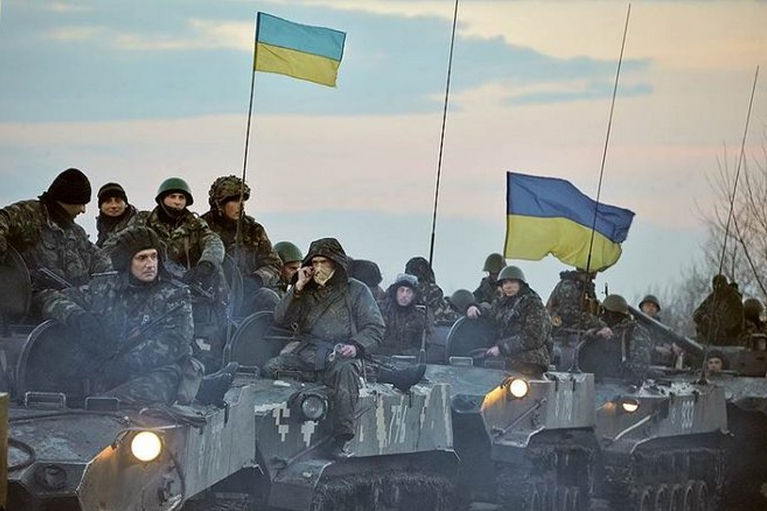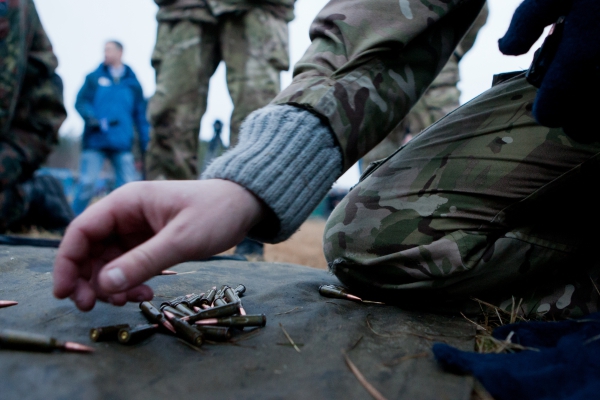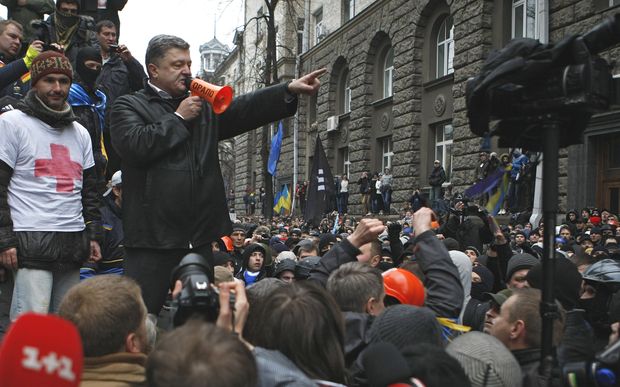Ukraine goes into battle
Despite all the fighting the country could just hold together after May 25th

UKRAINE is at war. The fighting does not admit to the name and it is low-intensity, but people are dying. It has elements of an insurgency, a civil war, foreign intervention and an information war. Russia has not moved its troops across the border as many feared, but it is fighting through proxies: Soviet army veterans, saboteurs, irregulars from Crimea, mercenaries and outright criminals. They grabbed government buildings in Eastern Ukraine and provoked the Kiev government into an “anti-terrorist” operation.
Indoctrinated by Russia’s information war, many civilians took up arms to resist what they believed to be a fascist regime that had seized power in Kiev. Most of the fighting is between armed men. On May 13th seven Ukrainian soldiers were ambushed and killed by rebels armed with grenade launchers near Sloviansk.
Nobody knows how many rebels there are, but 8m people in the Donbas region are in effect held hostage. Kiev barely has any control. Speaking Ukrainian or unfurling a Ukrainian flag is risky, even life-threatening. Some in the Ukrainian government are scared to visit. The local police and security services silently support the rebels: local authorities are careful not to oppose them. Journalists, particularly Ukrainian ones, have been kidnapped. Hatred of the Ukrainian language and symbols has been whipped to alarming levels.

On May 11th the rebels held bogus referendums, proclaimed themselves independent and asked to join Russia. Yet Russia’s goals appear different from those in Crimea. It is not interested in annexation, which would carry high financial and human costs. Despite the rebels’ claims that 90% of the population supports the Donetsk people’s republic, polls find that only 5% want Donetsk to become a state and another 27% want to join Russia.
Russia’s aim is to destabilise Ukraine and turn the south-east into a buffer zone that can be used to block further Ukrainian moves towards the West, whether through a trade deal with the European Union or some link to NATO. Yet Vladimir Putin, Russia’s president, may not be able to control the force he has unleashed: many separatists are placing their hopes in the Kalashnikov.

In many ways the Donbas was an easy target not just because it was mainly Russian-speaking, but also because it retains much of its old Soviet identity. Partly because it was dominated by Soviet industrial behemoths, paternalism and collectivism are still strong there. The share of small and medium-sized businesses in Donetsk is less than 5%. Individualism, a defining feature of the rest of Ukraine, is weak. “Whereas the western and some central parts of Ukraine saw independence in 1991 as a gain and a gift, the south-east of the country saw it as a historic accident,” says Tatyana Nagornyak, a professor of politics in Donetsk. Many people in Donetsk feel nostalgic for the Soviet Union. A celebration of Victory Day in Donetsk featured portraits of Stalin.
Successive Ukrainian presidents have done little to build a sense of nationhood, preferring to exploit the differences between the regions for political gain. The nation-state that started to emerge in Ukraine during the Maidan protests in Kiev was largely absent in Donbas. Opinion polls show that 70% of people in Donetsk saw the Maidan as an armed coup. It is home to Viktor Yanukovych, the ousted president. Donetsk is also the stronghold of members of his family and his entourage, who are now seeking revenge. The police and security services—long controlled by Mr Yanukovych’s son—are demoralised and sabotaging orders from people they see as usurpers. Donbas has a large proletariat and underclass—the base of the “Donetsk People’s Republic”.
Yet attempts to spread the conflict to other parts of the south-east have fizzled. Odessa, where more than 40 pro-Russians died in a horrific fire, remains pro-Ukranian. Kharkiv, which borders Russia, has not been lost to the rebels. Ukrainian flags and pro-Kiev forces also dominate Dnipropetrovsk. Igor Kolomoisky, an oligarch and governor of Dnipropetrovsk, is topping up the salaries of local police.
The means by which the country is trying to keep its regions together are dubious, but they are the only ones available, says Yulia Mostovaya, editor of Zerkalo Nedeli newspaper. Many Ukrainians hoped that Rinat Akhmetov, the country’s richest tycoon, who owns industrial assets in Donetsk, could use his influence and money to stamp out separatism. But he has trodden carefully, balancing his business ties with Russia and his long-term partnership with Mr Yanukovych against the need to preserve his concessions in Ukraine.
Yet Mr Akhmetov has no interest in seeing the region descend into an unrecognised grey zone run by thugs and gangsters, which would endanger his entire business. On May 14th he came out strongly in favour of a united, but decentralised Ukraine. His miners, though resentful of Kiev, have little time for the self-proclaimed Donetsk people’s republic. As Alexander Tkachenko, one miner, says “people who work don’t have time to go to the barricades.” The polls show that only 18% in Donetsk and 12% across the south-east support the actions of rebels who seized government buildings. But they also find that only a third of people in the south-east accept the legitimacy of the government in Kiev. This is why the presidential election on May 25th matters so much. And there is a risk that, whereas it will go ahead in most of the country, the Donbas will not vote, leaving the winner (most likely Petro Poroshenko, a business tycoon) a lame duck.

Petro Poroshenko - Most popular candidate so far and most likely Ukraine's future president.Known as "'Chocolate King', Ukrainian MP and backer of the Euromaidan protests in Kiev
Ukraine may nevertheless be able to keep its current borders (albeit minus Crimea). But the question is what sort of country will lie within those borders. Mr Putin wants to turn it into a federation and refers to separatists as “supporters of federalisation”. Vladimir Groisman, a young deputy prime minister, says this implies that the country should be dismembered into units which then form a kind of a federation.
What Mr Groisman and the Ukrainian government offer instead is devolution of power (both financial and political) from the centre to local councils, cities and regions, which would make the government more accountable and transparent. The reform has been in the works for some time and could have gone faster had it not been stuck in the Ukrainian parliament. There has been little progress on reform since the new government came to power.
This is playing into the hands of Mr Putin, who has always excelled in spotting weaknesses. The Ukrainian government has given him many opportunities. After the election on May 25th, it could at least make it harder for him to win, by building a properly accountable state—something it has so far spectacularly failed to do.

No comments:
Post a Comment